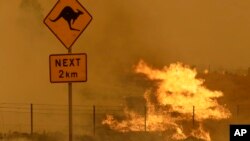Australia has become the newest member of the Climate Club alliance, a grouping of countries taking a more ambitious approach to tackling global warming.
The Climate Club was formed in 2022 by German Chancellor Olaf Scholz. It is supported by some of the world’s most advanced economies, including Canada, France, Italy, Japan, the United Kingdom and the United States, as well as Argentina, Chile, Denmark, Indonesia, Colombia, Luxembourg, the Netherlands, Switzerland, Singapore and Uruguay.
Its members are encouraged to voluntarily set bolder environmental targets to pursue net zero emissions by 2050, and also to require their trading partners to meet those standards. Such ambitions are opposed by major emerging economies like China, the world’s biggest emitter of greenhouse gas.
Australia is the Climate Club’s most recent member.
Curb emissions or pay for credits
The Canberra government committed last year to cut emissions by 43% by the end of the decade — almost double the previous target. In March, federal lawmakers passed legislation mandating Australia’s biggest greenhouse gas polluters to curb emissions or pay for carbon credits.
Nicki Hutley, an adviser to the Australian environmental organization Climate Council, told the Australian Broadcasting Corp. Tuesday that the Climate Club has sound ambitions.
“It is very much in Australia’s economic interests to join this club to make sure that we decarbonize our industries as well," said Hutley. "The more people join this club — the more we are on this race together, the more we can collectively support developing and emerging countries — then the better it is for everybody.”
Conservationists concerned
Coal and gas continue to dominate electricity generation in Australia but there is an unmistakable shift to green sources of power.
In April, the Clean Energy Council, an industry association, said that clean energy accounted for 35.9% of Australia’s total electricity generation in 2022, up from 32.5% in 2021.
However, some conservationists worry that Australia’s transition to renewables — mostly solar and wind — is not happening fast enough.
They have insisted that Australia is on the frontline of global warming, which is intensifying the severity of its fires, heatwaves and storms. They fear the devastating wildfires of 2019-’20 could be a sign of things to come.
The United Nations has warned that an El Nino weather pattern — a naturally occurring phenomena that is currently underway — would likely see a “surge in global temperatures and disruptive weather and climate patterns.”
In Australia, El Nino events are associated with increased risks of droughts, heatwaves and wildfires.




